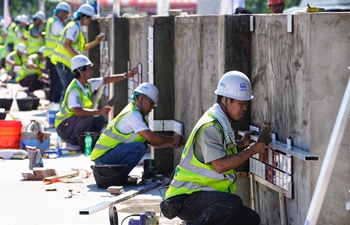GENEVA, Aug. 27 (Xinhua) -- The International Federation of Red Cross and Red Crescent Societies (IFRC) warned on Tuesday that besides effective vaccines and treatments, building trust and understanding in Ebola-hit communities in the Democratic Republic of the Congo (DRC) is equally important.
The warning came as the death toll for the Ebola outbreak in the DRC has been approaching 2,000 and as the total number of cases reaches 3,000.
The effective new treatments and continued roll-out of vaccines alone, according to IFRC's Director of Health and Care Emanuele Capobianco, have been not enough.
"For the treatments to work, people need to trust them and the medical staff who administer them. This will take time, resources and a lot of hard work," he argued, calling for doubling down on efforts to engage at-risk communities.
The IFRC held that continued high levels of distrust mean many Ebola patients are delaying or avoiding going to health facilities. This reluctance significantly decreases their chance of survival, even with access to the newest treatments.
It also dramatically increases the risk that the virus will spread to family members and other care givers, as more than 42 percent of alerts that Red Cross receives to bury a loved one are coming from a death at home.
"We are asking communities to change the way they care for the sick and the dead in ways that go against their traditions. And we are doing all this in communities that have learned to distrust outsiders following decades of violence and unrest," Capobianco said.
"This is our biggest challenge. It is a behavioral challenge, not a medical one. And unfortunately, there is no magic pill to change behaviors."
Currently two new treatments that are hailed as an effective cure against Ebola are being administered in Ebola treatment centers all over North Kivu and Ituri, the epicenters of the Ebola outbreak. The IFRC believes that if people understand that the treatment can save lives and can reduce the risk of transmission to their loved ones, they are more likely to seek health care early.

















